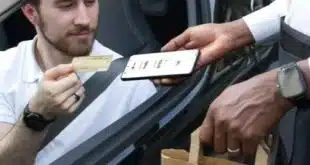Open-fare payments for public transportation got a big boost when the Chicago Transit Authority announced it had awarded a $454 million, 12-year contract to Cubic Transportation Systems to build and maintain a payment system that accepts contactless cards. The CTA, which provides about 500 million rides a year, thus becomes the biggest U.S. transit agency yet to commit to tap-and-go open-fare payments systemwide; the only other one is the much smaller Utah Transit Authority in the Salt Lake City area.
The contract is the largest one ever awarded in North America for automatic collection of transit fares, according to Cubic Transportation, a unit of San Diego-based Cubic Corp. A number of big-city transit agencies are looking to replace aging, proprietary fare systems with new technology that accepts general-purpose contactless debit, prepaid, or credit cards that will provide fast passenger boarding of buses and subways and get agencies out of the business of issuing proprietary cards.
Eric Reese, CTA general manager of business development, tells Digital Transactions News that reasons the agency is going with tap-and-go open fares include “increasing the convenience for riders, the cost savings, eliminating the need for capital investments, as well as shifting the risk to the Cubic team.” Those risks, he says, include fraud, data breaches, chargebacks, and other operating expenses.
Reese expects the new system to save the agency about $5 million a year. Cubic built the CTA’s current fare operation, which dates back to about 1993 and includes two proprietary chip cards, magnetic-stripe fare cards, and cash. The agency says it picked Cubic, the low bidder, after a two-year selection process. The CTA has approximately 1,800 buses, including spares, 780 gates to its “L” elevated-train and subway stations, and 420 ticket vendors.
New fare media also will include CTA-branded reloadable prepaid cards. Those cards are likely to pick up a big share of fare payments, at least at first, because banks and credit unions have issued relatively few major-brand contactless cards to their customers. Aite Group LLC recently estimated U.S. banks have 70 million contactless cards in issue, but the total pool of Visa, MasterCard, American Express, and Discover credit and debit cards exceeds 1 billion.
The “overwhelming majority” of the prepaid cards will be of the general-purpose variety, though some special-fare cards for qualified riders could be closed-loop, says Dave Lapczynski, Cubic senior vice president, Services. First Data Corp. is overseeing the prepaid card operation and is in the process of selecting a bank as issuer, he says. Cards will be free for transit use but might have fees for other uses.
Buses and turnstiles on the L system will no longer accept mag-stripe fare cards. Customers will still be able to use cash much as they do today to board buses or buy transit cards at retail locations or the CTA’s customer-service center, according to Lapczynski. Cards will be sold in 1,000 locations when the system launches, including at stations and stores in the city and suburbs, compared with 700 today, and plans call for the sales network to increase to 2,000 outlets.
Cubic will provide all of the fare-collection equipment, maintenance, and support, according to a CTA news release. The agency will pay Cubic a base fee and a per-tap transaction fee from revenue on a monthly basis. The CTA will maintain full control of fare policy, a sensitive issue in a city where former Mayor Richard M. Daley sold the city’s parking meters to a private company that gained control of pricing.
The CTA said there would be a transition period in which all current media would be accepted, and “an extensive public-education campaign.” Cubic says the new system ultimately could accept mobile payments.
Several transit agencies have tested open-fare contactless payments, including New York’s Metropolitan Transportation Authority. The Washington Metropolitan Area Transit Authority (WMATA) in the nation’s capital and the Southeastern Pennsylvania Transportation Authority (SEPTA) in Philadelphia are actively pursuing new systems, according to Lapczynski.





